The most common question I get from new owners is about the cost of watercraft.
Dealerships will vary greatly in pricing and practices, with some haggling and others not.
This post aims to provide insights into markup, assembly costs, and potential fees when buying. It’s important to note that the exact details will vary by location.
4% To 8% Margins
Let’s get right to the point, a jet ski can have 4% to 8% margins.
I’ve had people think they have 40% margins, and some think they have 1%. The answer is closer to 6% on average for most.
What is interesting about this margin is that it doesn't include things like freight, prep, taxes and so much more. Even more amazing, is that a lot of the fees and taxes can't be hidden in the price either, so paying over MSRP is quite normal.
Just think about it, if your state has a 6% sales tax, there is no way a dealership could, within a good reason, sell a unit and make money off the deal if it has a 6% or even 8% margin.
What Has The Biggest Margins?
The more expensive the jet ski, the more the average dealership will make.
If margins are equal, a unit that costs $16,000 will have more wiggle room than one that is $8,000.
So don’t expect to get a great deal on a budget model compared to the top of the line model.
What to expect for fees when going to the dealership?
Every dealership will have some kind of fees, either from the manufacturer, state, or the cost of doing business.
To fully understand how all this works we need to do a made-up example, let’s assume a jet ski price of $8,000 and it has a 6% markup.
$8,000 * 6% = $480 Profit
But we’re not done, there are still…
- Taxes
- Registration
- Freight
- Prep
- Doc
- Trailer, if you get one
There can be even more fees depending on where you live. Let’s break down each fee to help you better understand why they exist.
I’ve also made a jet ski pricing calculator that takes all these factors in and allows you to play with the numbers to see how much you can afford.
Taxes
If your state or country charges sales taxes, you’ll have to pay that when you buy your watercraft.
Some states have a sales taxes that are greater than the profit they would make off the sale. So, they can’t hide that charge in the price of the unit.
You also can’t avoid paying taxes, the tax man always wins.
Registration
Taxes are not the only thing you need to pay, but you must also pay and register your boat with your state’s wildlife center.
It may go by different names all over the world, but in many places you register your boat (PWC) and get assigned vessel numbers.
Think of it as a license plate for your boat.
You also have to renew it every year or whatever interval you pay for, some can go multiple years.
Not keeping up with this can result in you being pulled over by the water patrol and getting a ticket.
Some dealers may not do the registration for you, some do, but overall, you’ll need to have it in many places.
Freight
Freight can be a sore spot for some buyers, but it is a cost.
The watercraft needs to get to the dealership somehow, and that is by truck. Shipping is not free, even though some online stores don’t charge for it, they actually do as their margins are just better.
And a watercraft is not that small, with most being 12 feet or longer, they take up a lot of room on semi-trucks. They are put into crates, so they can be stacked, but mostly two high.
What manufacturers do is average out the cost of shipping. So those many dealerships located further from the factory are not paying more.
While some think this fee can be negotiated, in a lot of case it can’t. The honest truth, you’re paying this fee even if you’re not. Unless the store wants to lose money.
Freight is not cheap, it can vary, somewhere around $500, and it keeps going up every year due to inflation and shipping costs going up.
Prep
As covered in the freight fee, they come in crates, which means they need to be assembled.
I’ve had a few people give me the line that they can assemble it themselves in an attempt to save money, but the reality is that they cannot.
Even if you’re skilled and have all the right tools, you still lack the software from the manufacturer to program the machine. Without that software, you have an expensive canoe.
The manufacturer isn’t doing this to force you to pay for prep, but instead to cut down on theft. Until the unit is programmed by the dealership and activated, it’s useless. Taking it to another dealership to get programmed won’t work either, as the stolen unit go in a database.
With prep, you also have the cost of the battery, fire extinguisher, gas and everything else that is needed to get the waverunner going. The dealership will need to add these things to make sure it runs fine, so it’s best to pay the prep charge.
The good news is that every dealership prep (put the thing together) fee is different, so you can use that to your advantage.
Doc
The doc fee is short for document fee. Every dealership will have a different amount they charge.
Not paying the document fee can be tricky due to DMV laws, which apply when buying a trailer to haul your PWC. Some states even have a limit a dealership can put on the bill of sale and charge.
Negotiating the doc fee will be hard, it’s best to Google your state’s regulations on doc fees and get multiple quotes to fully understand.
Do They Make Money Off The Backend?
A car dealership can (and often do) sell a car at cost and still make money, as the manufacturer has holdbacks.
This is not a thing for jet skis, at least in the way you think. A dealership that is trying to sell units at cost will go out of business very soon.
Watercraft are a want, and not a need, so the cut-throat business that comes from car sales is not something that shows up here. Sure, there is competition, but the car dealer tricks are not a thing here.
Most often, the price is the price.
No hokey-pokey and turn yourself around like with car dealerships. There may be promotions from the manufacturers that lowers the price, but most of the time they have a warranty offer that is better value if you ask me.
Where The Real Money Is Made!
Selling new is not as profitable as many think, and the real money is made in accessories, service, and used sales.
If you want to get the best deal possible…
—Always haggle over the accessories and services—
They’re selling the jet ski to get you to the gear you’ll need, and often need routinely.
If you want to know what accessories you need, I have a post that goes over that here.
Will They Sell At A Loss?
Dealerships may (in a blue moon) sell at a loss when demand is low or units sit on the lot for too long, costing them money.
Unlike cars, watercraft don’t have frequent auctions, so unsold jet skis remain on the lot until sold or transferred. Units that have been sitting for a while offer the best deals.
The Price They Say Vs. The Real Price
I’ve been price shopped a lot, and it’s okay, but it’s always interesting seeing some deal’s aftermath.
I’ve noticed a trend with some dealerships that they just want you in the door. So the price they give you is not always what you end up paying. There are so many tricks that are played that it could be its own article
You’ve got to be careful when pricing shopping; I go over many tips for buying a new jet ski here.
What's interesting to me is the kamikaze deals. One dealership says a super low price, you agree to buy, but when you show up the price changes because of this or that, and now you're put off from buying a jet ski from anyone. It was a win-win for the dealership that is selling at the super low number. They either sell a jet ski for more or got you out of the market and the competition doesn't make a sale. Imagine the customer who spent weeks or month researching the perfect jet ski and found the perfect price after talking to several dealerships, then it all comes crashing down. Some do end up paying more as they're ready to be done with it, and the others move on to something else.
Supply And Demand
PWCs suffer from supply and demand, just like most things in the world.
They are also seasonal, everyone wants one in the summer months, but not so much in the winter.
It’s important to keep this in mind when buying, as the season and how hot the item is currently can affect the price. In 2020-2023 we saw many selling for way more than they normally do, but they were in high demand and supply could not keep up.
Expect to pay more during the busy seasons for PWCs that are in demand.

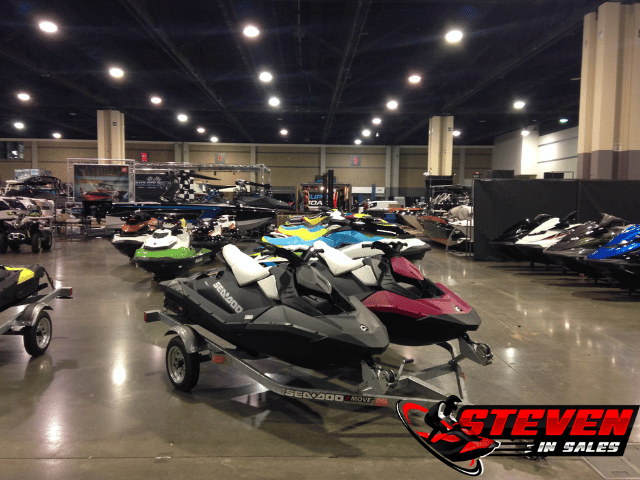
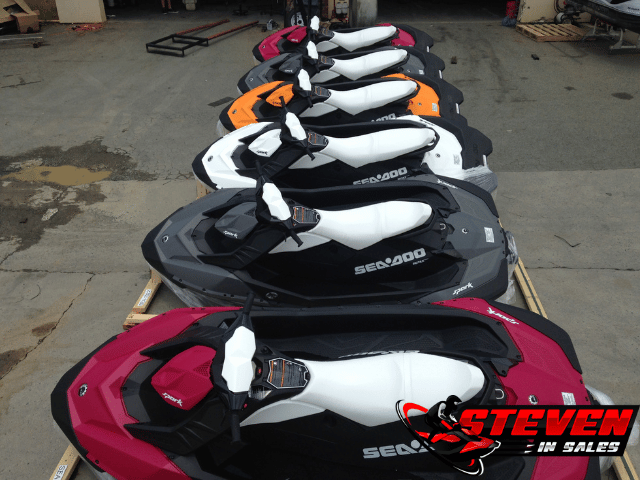
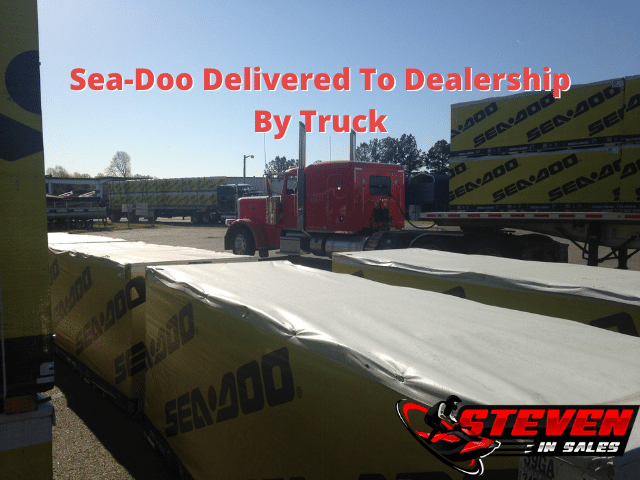
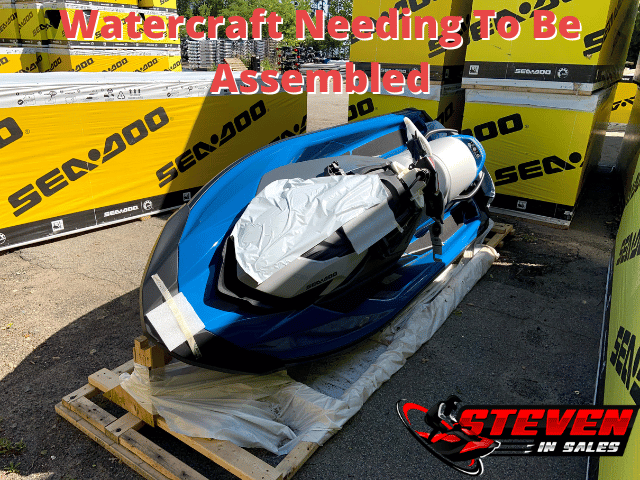
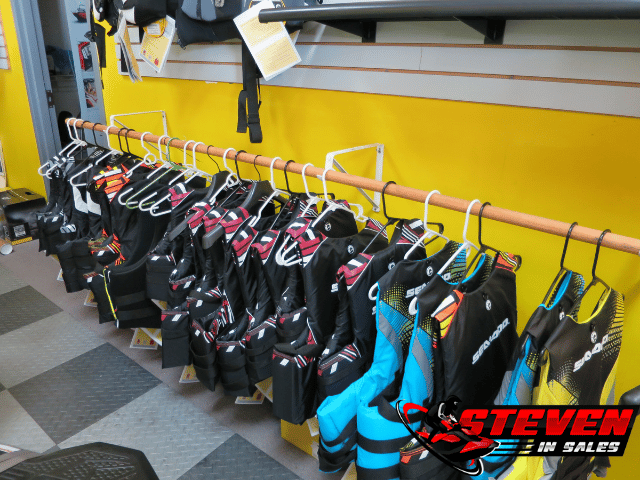
Hi Steven
Looking at buying my first Jet Ski.
Everyone says buy new if you can and wait until winter.
Also thinking with the state of the economy there will be some bargains coming up.
But I am considering at a 2021 Sea Doo GTR with 100 hours, includes trailer.
$1000 sound system.
It’s from a mate so I know its history.
It’s hard to predict the future, the bargains may come or things may get more expensive. But if you got a friend selling a jet ski and know the history, I would go with that one and start having fun!